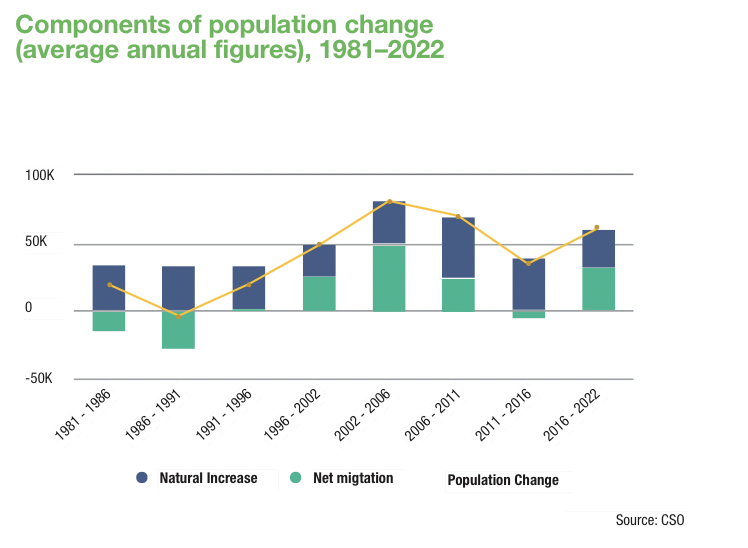A turbulent economy

Turbulence surrounding Ireland’s economy is no longer infrequent and has become part of the everyday context, the Government’s economic and social advisors have highlighted.
The National Economic and Social Council (NESC) in a report to the Cabinet, has argued that amidst economic turbulence, a capacity challenge, and a cohesion challenge, having “a vision and a number of core, supportive lines of action are an essential means of working in this era of turbulence”.
In its report, commissioned over a year ago to examine the cost-of-living crisis following the outbreak of war in Ukraine, the council has identified three core areas of economic action and ambition in the form of: fiscal sustainability and investment; acting to realise net zero; and making work attractive.
The council’s report is set in the context of a number of sources of turbulence affecting Ireland’s economy and the policy system’s ability to respond. The climate and biodiversity emergencies, demographic shifts, and geopolitical change are among the pressures identified outside of day-to-day challenges. The council notes that Ireland’s public policy system has demonstrated “flexibility, responsiveness, and effectiveness” to previous shocks, not least Covid-19, and suggests that it is advantageous that Ireland has demonstrated that “building economic resilience can be undertaken on a foundation of progress delivered by the enterprise economy over recent decades”.
However, while the council commends a legacy of policy emphasis that has supported firms to boost competitiveness and productivity, underpinning progress on employment, incomes, and poverty reduction, it stresses that recognising vulnerabilities is a key aspect of building and maintaining economic resilience.
One of the vulnerabilities flagged is that of a capacity challenge, stressing that resilient performance to date is threatened by “significant capacity constraints that persist in transport and energy infrastructure, housing, and health and childcare services”.
“Overall, access to services such as health, transport, education, and housing is often more important in securing people’s living standards and participation in the economy and society than having a higher monetary income,” the report states.
Alongside the capacity challenge, the council has also identified a “cohesion challenge” between the economy and wider society. Although recognising that Budget 2023 was, in both relative and absolute terms, the largest ever programme of direct state support for families and businesses, and that in recent times significant steps have been taken support the most vulnerable in society, it is highlighted that certain cohorts have experienced little change.
“By many metrics, Ireland today is a prosperous and successful country. The policy focus on a competitive, innovative, and export-orientated enterprise base has generated record levels of employment and higher living standards and has provided significant tax revenue to the State in order to meet wider, societal ambitions. However, for that policy to remain sound, persistent vulnerabilities must be named and tackled.”
Calling for concerted policy action, the Council illustrates that the association between unemployment and income insecurity within the labour market, with growing levels of social inequality has the potential to “generate substantial negative externalities for the State in terms of both the loss of tax revenue and increased welfare expenditure to mitigate the effects of ‘bad jobs’”.

The report adds: “The rapid and sustained increases in the number of families in receipt of supports, coupled with the dangers associated with any growth in the incidence of precarious employment, make it all the more important to ensure that the income support system does not inadvertently contribute to a rise in the number of people in low-paid, insecure employment.”
Looking to the future, the report recommends a number of actions for greater economic resilience to economic turbulence. Amongst its recommendations is the creation of a new pensions reserve fund to contribute to the future cost of paying pensions.
According to NESC, age-related increased in public expenditure and a slower pace of revenue growth could drive a deficit of as much as -4.7 per cent of GNI* by the end of the next decade, and as much as -9.3 per cent of GNI* by 2070, without policy intervention.
“Both the revenue and expenditure side of Ireland’s fiscal accounts will be adversely affected by this demographic change. Without significant structural reforms, a large deficit will emerge, and the debt ratio will move onto an unsustainable path, with significant effects on our fiscal and economic resilience.”
The council believes that there is value in establishing a fund to make a contribution towards future costs.
Beyond demographic changes, NESC makes a series of recommendations, including the maintenance of public investment across economic cycles, particularly in infrastructure. Areas of focus relate to housing, where incentivising longer tenancies is suggested, and the drive to net zero, where demand reduction measures feature prominently.





